Mark Duplass: A Portrait of a Man With Good Intentions
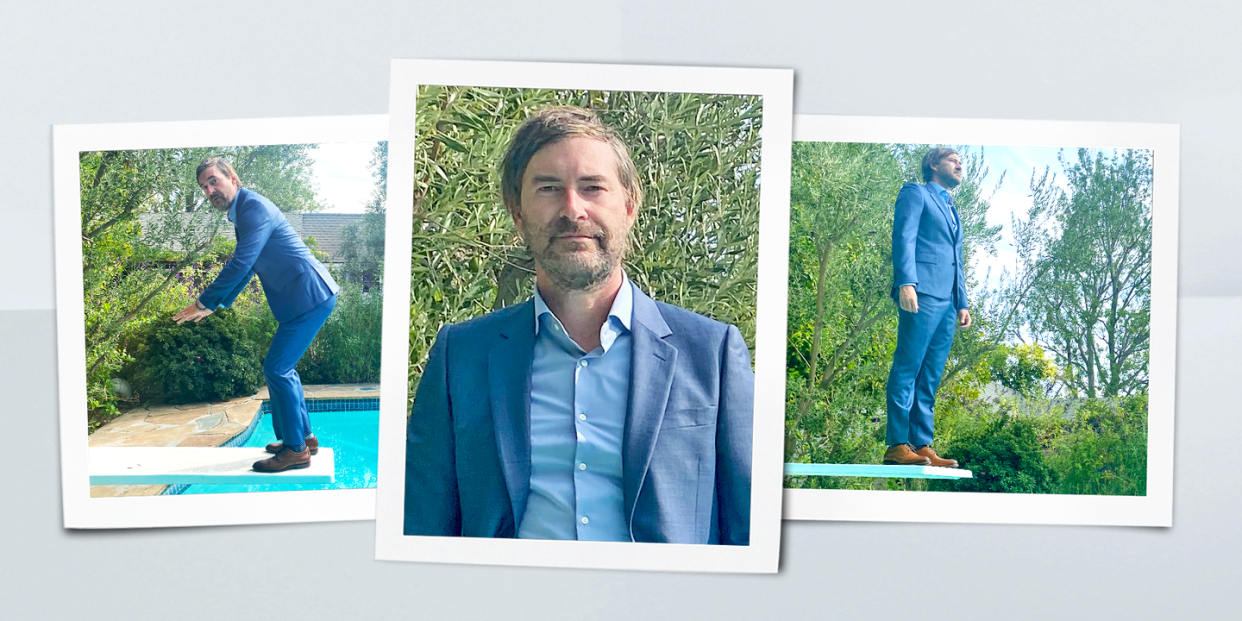
- Oops!Something went wrong.Please try again later.
Late last year, in the height of the pandemic, Mark Duplass and his wife Katie Aselton sold their beautiful Silver Lake house. A modern day mansion with a red wood interior. Chef's kitchen. Tub deep enough to drown a horse. He had recently finished filming a movie there, and afterward, the couple sat together and came to the conclusion that having a house that big and that gorgeous was silly. So they sold it and moved with their two daughters into something smaller. More appropriate. And then they took the extra money and founded a non-profit to help underrepresented people who don’t have the capital to launch their own film or start up.
On a Zoom call in late September, approximately 2,800 miles away from each other, Duplass lifts his dad cap to reveal a 40/60 salt and pepper split, shakes his hair a bit, and candidly says to me, “It was well intentioned. Is there some white savior stuff in there? Probably.”
Mark. Mark.
That surprising candor makes me twitch a little because it’s a rare moment of transparency from the type of person who’s more or less taught to guard themselves at all costs. You can hear the proverbial alarms. Do not engage on the record with a white savior complex! Do not be this honest!
But over our afternoon Zoom chat, Duplass proves to not really care about what you're supposed to say or feel. I mean, take Zoom for instance. It’s become an annoyance to most, but Duplass finds the whole thing fascinating. Frankly, it’s an opportunity for him to say less, but as Duplass and I settle into the conversation, he finds it actually reveals more (evidenced by him assessing the art on the wall behind me). Some things to know about Duplass: he loves the word “fuck.” He is unafraid of making mistakes. And he loves to dissect things that most of us would rather avoid talking about.
Duplass does that a number of times during our conversation—takes something deeply personal and breaks it down into its individual parts. Friends have told him he has a fascination with doing so. And over the last year, as he’s worked on the second season of Apple TV+’s The Morning Show and the indie darling Language Lessons, he’s been more and more preoccupied with the little things: things we can and cannot know. What can be learned from what’s in front of you and what you can learn by what isn’t there. Even if it’s complicated.
Duplass’s pandemic era came with its share of emotional hurdles. Early in Spring of 2020, his long-time friend and collaborator, Lynn Shelton, died of leukemia. Officially in the throes of social distancing and peak-Covid fear, a traditional mourning process wasn’t on the table. No one knew how to grieve, you know? So all of Shelton’s friends and admirers, spread across the world, decided the best course of action would be to hold a global shiva. For a week, anywhere from 50 to 100 people would show up each night on an open video call. They could talk, or not. Actively listen, or simply have it on in the background. Duplass thought it was incredible because it was much-needed intimacy, available at the click of a button.
“As a person who is constantly on the hunt for intimacy and ways to get closer, it's just a different tool,” he says. “I think you have to just be a little more vigilant about how to do it on video because we're just not used to it.”
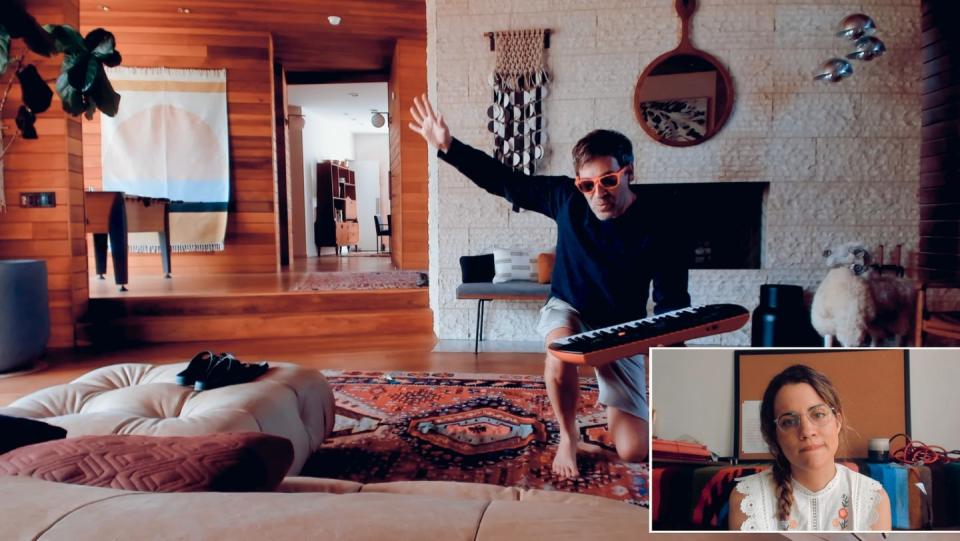
Even with Shelton’s death eighteen months in the past, it’s a topic that he brings up over and over: working with her as he got his start and the way she influenced his perspective. And though it may not have been clear at the time, that loss, at least in part, inspired Language Lessons—a feature-length drama starring Duplass and Natalie Morales as a widower named Adam and Spanish instructor named Cariño, respectively. The entire film is set over a video chat. For 90 minutes, the two develop a complex relationship following the unexpected death of Adam’s husband. In the wake of the loss, the Spanish lessons Adam’s husband purchased him take a backseat to the trauma in their own lives. But to make a video-based narrative work (and in the past year and a half, it’s a premise that has failed more often than it’s succeeded), there had to be something that made it feel meaningful.
“They don't know what the bottom half of each other's body looks like, so how can you really be a close friend of someone like that?” Duplass says, before answering his own question. “But I think we have all had relationships like that in our life that make us question: is this real or not? Whether it's the two weeks you spent at camp with someone where you got really close but you don't live in the same state. You write each other letters for a couple weeks and then it's over. Does that mean it wasn't real? Does that mean it was less intimate?”
That rhetorical question is part of what made the production of Language Lessons so intriguing. He reached out to Morales with the concept. He wanted her to direct; he'd produce the film. They agreed to write their characters' back stories individually. They’d work quickly with the hope that the crude medium would be as raw and heartfelt as the film’s premise. The result was rooted more in emotion than it was strategy. Could these two people from unrelated backgrounds, created independently, find real connection with one another? Cariño lives in Costa Rica, making ends meet via teaching online language courses. Adam lives in Oakland. He’s got big money. He’s got the giant house. His life, in some ways, mirrors Duplass’s. The whole film wrapped up in four weeks.
The scenes with Adam were shot in that home Duplass sold during lockdown. Save for one scene, the two never share the screen together. “What you're seeing on camera is also Mark and Natalie discovering each other and platonically falling in love. The way I experience butterflies and the newness of human connection is in my platonic relationships.” He follows it up, quickly, with the caveat that he’s done falling in love, romantically. But Morales? He describes her as someone with a lot of complicated, deep platonic relationships. That complexity was the goal, both on screen and in his every day life.
Duplass also saw it as an opportunity to put Morales in the director’s chair. With the release of Plan B earlier this year, Language Lessons marks Morales’s second outing as director. “I do have a little bit of a crisis of conscience, as a white male in a position of power; what is my role in terms of taking up air space right now?” he asks. “By me having an intense collaboration with Natalie Morales, giving her a platform to tell her story her way, me being able to be a part of that but not in the driver's seat, that's my solution as to how to add the right voices to the world but also get to still be a part of it.”
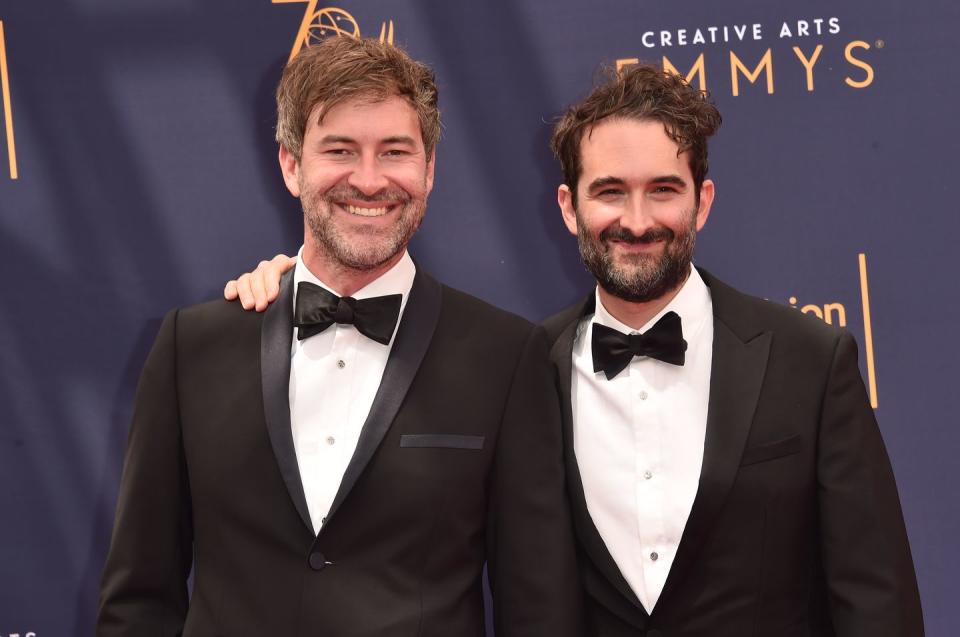
The non-profit Duplass started is called The Friends & Family Bank. The idea was to support projects in entertainment and art, startups, and real estate ventures for people who don’t have the generational wealth to do it on their own. The company has a focus on underrepresented groups, in particular. A project like this feels like the next logical step in the footprint Duplass wants to leave with his career.
Mark and his brother Jay grew up in a middle class New Orleans family that wasn’t particularly well-off. But they weren’t broke either. When the duo set off to make their first film, The Puffy Chair, their parents gave them an interest free loan of $10,000. The idea is that with this non-profit, he could do the same but for, you know… strangers. Strangers whose parents don’t have that kind of cash hanging out in savings.
Duplass spirals into the fine print, getting into the granular details about the intersection of money and privilege and how we operate in a system that rewards the wealthy while hindering the disadvantaged through invisible barriers and limited access. You know, small talk. “My idea would be to be able to give people money to have the down payment to get a house. Then they're paying in mortgage what they would pay in rent anyway,” he explains as our conversation becomes a course on financial literacy. “The number one way to create generational wealth is in home ownership.” He looks into the camera as if I’m supposed to hit the next slide for his TED Talk.
Coming up through the festival circuit, Duplass came to realize that all the people around him were a bunch of other white dudes. As he entered his mid-40s, career more or less fully stable, he saw that he had an opportunity to run a different kind of operation. He and Jay named Mel Eslyn (a fellow director, producer, and writer) as president of their production company.
He follows up his praise of Eslyn and producer Shuli Harel with the caveat that this isn’t about representation; it’s about hiring the best perspectives to run his company. But finding the right perspectives is about being a bit more dogged. It requires relying on recommendations and less on stacked resumés. It’s that whole chicken-egg of finding the right people in a system that only caters to one type of person, and it reeks of effort, which is why most people in positions of power give up on it.
“I'm going to step in shit along the way and I'm not going to get it right,” he says of his role as a producer in Hollywood. “But I'm willing to do that. I'm just going to do my best to be careful and be thoughtful, make some errors, own my blind spots, and keep moving. What else you going to do?”
Duplass’s meditations on Hollywood and representation aren’t too far removed from the plot of Apple TV+’s The Morning Show. Its inaugural season was rewritten entirely to focus on the #MeToo reckoning happening in media and entertainment. Duplass’s character, Charlie “Chip” Black, is an executive producer on the titular morning show. At the end of the first season, Chip becomes the fall guy for the network when horrific levels of sexual misconduct are revealed. Its second season picks up with what the fictional UBA network is doing to rectify its reputation, months before the pandemic and racial justice protests break out across the United States.
In the first few episodes of Season Two, the network’s president resigns. The president of the news division is put on leave. In his place, a woman of color is put at the helm. It’s the paint by numbers solution that we’ve seen entertainment and media companies do on loop since the world started addressing sexual misconduct at the C-suite level.
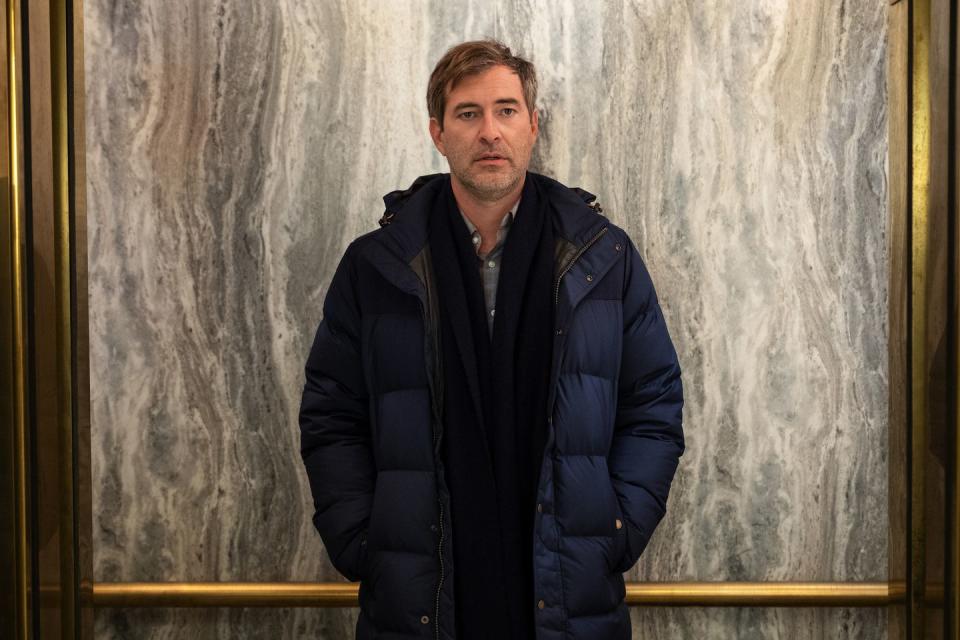
These social justice reckonings happening in the media are often very public, very tenuous, and rightfully filled with skeptics. “Unfortunately, one side of that movement is just doing it because they don't want to get canceled, and they're doing it for the optics,” Duplass says of the changing nature of the entertainment and media industries. “The truth of the matter is while it's not the greatest motivation in the world, it's at least still moving things in the right direction, and we're still seeing good hires.”
Again. Mark. Alert! Alert!
These blunt declarations that Duplass makes are refreshing, yes. Brutally honest, sure. But they’re not the shiny ideal that we hope for. In the idealized search for social justice, we have come to expect purity. But it comes to social justice on The Morning Show and in our own world, the moral center of “wokeness” becomes a bit murky. Actions are great, but in a society that loves to split hairs, you also have intention to consider. The righteousness of the objective. Great job, Mark Duplass, for being a good man in the cultural storm, but to what end? To what end!
“I think that we're working really hard personally, but if I close my eyes and I'm totally honest with myself,” he says, eyelids literally clenched shut as he lets out a big exhale. “I think that I'm sure there's part of me inside that wants to make sure I look like I'm on the right side of the story, too. You know? Because everybody's nervous about that, and I think if everybody was honest with themselves, they would probably find something in there that feels a little bit sweaty.”
That last answer leads us into a whole discussion about the existence of pure altruism and, listen, there are not enough premium Zoom accounts or whiskey pours to have that conversation over video. So instead, he settles on something a bit more straightforward: “My take is, as a white man in a position of power, it's not my time to complain about, ‘Oh God, it's so delicate. I have to be so careful.’ Fuck you. Be delicate. Be careful. Be thoughtful.”
Opposed to debating theoretical morality, we focus more on execution. The things that are being done correctly. The Morning Show was Apple TV+’s flagship series when it was launched. Considering the show's premise, it was paramount to have the right people guiding the ship. Six of its seven executive producers are women, which include stars Reese Witherspoon and Jennifer Aniston. Duplass and Aniston, in particular, share quite a few scenes together; both were nominated for an Emmy for the series’ first season. “Acting with Jen is one of the great life privileges. She has no business being as open and wonderful and unguarded as she is, considering she is an international icon. She's like acting with a little kid who's still figuring it out for the first time—open and vulnerable and humble and just a great scene partner.”
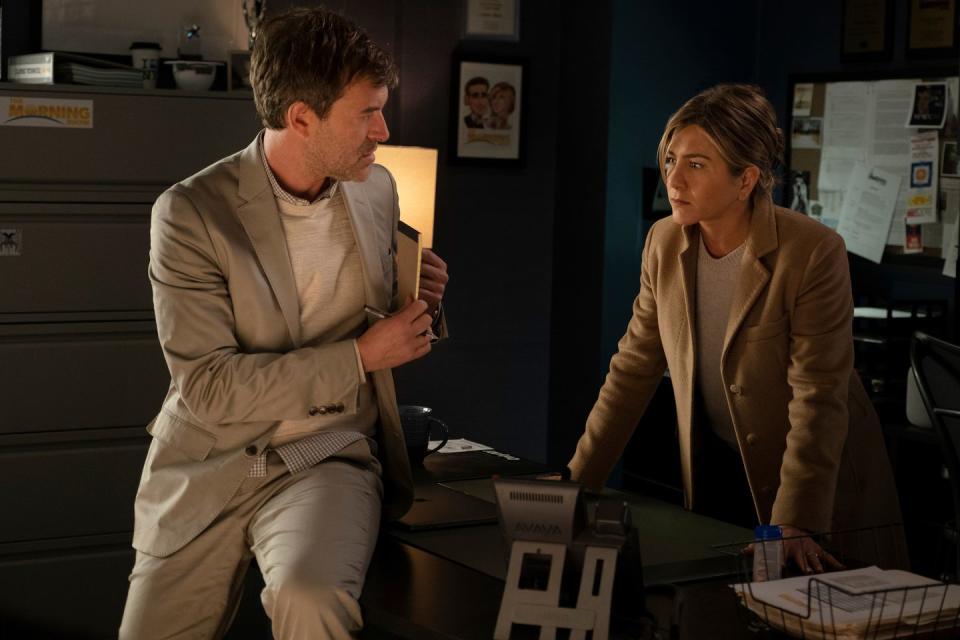
Chip, who serves as a producer for Aniston’s Alex Levy, has an intensely close relationship with Alex; one that verges on the side of peculiar. When asked if there's any similarities between their on- and off-screen relationships, Aniston jokes, “Well, not the peculiar part... but the trust is there, 100 percent.” As the series moves into the heft of its second season, Alex and Chip are thrown together more closely than we’ve seen them before. “I had been dying to work with Mark for years,” Aniston adds over email. “To finally get the chance to be in scenes with him exceeded my expectations a thousand fold. He’s just an incredible, dependable partner.”
While the series may have its fair share of prickly characters, Duplass is insistent that those personalities don’t permeate the set. With a cast of veteran actors aboard, they bring some collective wisdom with them. “When you're making a film or a TV project, you got to load it up with a good amount of people. The more people you put inside of that box, the more chances are that one of them is going to be a real fucking asshole,” he says. “I'm seeing people in my own industry who have excellent taste—who are extremely intelligent, powerful, and make good TV shows and films—I'm seeing those people being blackballed because they behave poorly, and that is wonderful. I'm really glad to see that happen.”
Like a lot of what we’ve talked about, Duplass always finds a way back to how everything we do now can affect generations ahead of us. He tells me about this habit of his where he’ll be sitting somewhere, having a conversation and completely zone out. He’ll have an idea for a movie or a TV project, and he’ll disappear into that world, leaving the conversation at hand behind. It’s bad enough that he admits at some point in life, he hopes it stops. Or at least slows enough that he can lay in bed and enjoy the quiet.
“My nine-year-old daughter has the exact same thing. I wake her up in the morning and she's already up. I'm like, ‘What are you doing?’ She's like, I was just sitting in bed and I had this movie idea,” He puts his hand over his eyes and says, “I was like, ‘Oh God. Please, I'm so sorry.’ It's just this thing that I can't stop.”
His own search for quiet has turned him toward projects that highlight the genius of others. Morales’s Language Lessons is chugging along in theaters. He and Jay are producing an in-depth documentary on Tony Hawk’s life. Eslyn is also directing her first feature film called Biosphere starring Sterling K. Brown and Duplass. And of course, if The Morning Show gets a third season (and its cast survives the impending Covid-storyline), he’ll likely continue on as the hopelessly loyal Charlie Black. In a way, the skill he's honing now is the ability to recognize the brilliance of others.
Coming off an 18 month pandemic that kept actors at a distance from each other, he’s acutely aware of how important people are now. “When I did this movie Biosphere with Sterling, he's just such a beautiful artist and is such an incredibly intelligent, soulful human being,” he says. “Then he tells me he's binging episodes of The League, and I was like, ‘Of all the stuff you're watching of mine, you're watching The League?’ He's just like, ‘I love it. I love it!"
But that’s the fun, if not terrifying, part of art. Or honestly, being alive. The way the world interacts with you and your actions and your intent is largely out of your control. It's the perception—what is seen and felt—that ends up taking precedent. The gift, I suppose, is that the world cared to interact with it at all.
You Might Also Like

